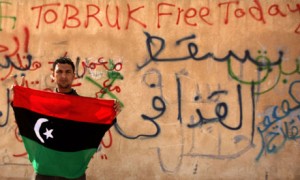 Opposition activists are increasing the pressure on Muammar Gaddafi’s ailing regime, shutting down oil exports and mobilising rebel groups in the west of the country as the revolution rapidly spreads.
Opposition activists are increasing the pressure on Muammar Gaddafi’s ailing regime, shutting down oil exports and mobilising rebel groups in the west of the country as the revolution rapidly spreads.
In a rambling appeal for calm on state TV, Gaddafi blamed the revolt on al-Qaida leader Osama bin Laden, and said the protesters were fuelled by Nescafe spiked with hallucinogenic drugs.
Gaddafi’s hold on power appears confined to parts of Tripoli and perhaps several regions in the centre of the country. Towns to the west of the capital have fallen and all of eastern Libya is firmly in opposition hands.
In Gaddafi’s latest broadcast, he spoke to state television by telephone without appearing in person, and his tone seemed more conciliatory. But it was peppered with bizarre references – he compared his authority to the British Queen and said of the protesters: “Their ages are 17. They give them pills at night, they put hallucinatory pills in their drinks, their milk, their coffee, their Nescafe.”
In Benghazi, the country’s second city, basic order is returning to the streets after days of fierce fighting that resulted in the military defecting en masse. Virtually all government buildings were looted and wrecked.
There are long lines outside closed banks as people try to resume normal life. Cars have returned to city streets but almost all shops remain closed and the internet is blocked.
Benghazi is now being run by a makeshift organising committee of judges, lawyers and other professionals who have sent out young people to direct traffic and restore basic order.
One high court lawyer, Amal Bagaigis, said: “We started just as lawyers looking for our rights and now we are revolutionaries, and we don’t know how to manage. We want to have our own face. For 42 years we lived with this kind of barbarianism. We now want to live by ourselves.”
The town of Misrata, about halfway between Benghazi and Tripoli, is reported to have fallen after days of violence. A resident, Abdul Basit Imzivig, told the Guardian that regime forces had fled overnight and the city was in opposition hands.
All southern oilfields are in rebel control. Moustafa Raba’a, a mechanical engineer with the Sirte oil company, said pressure had been put on field and refinery managers to stop work and protect all foreign nationals working with them.
“The order was put out to send a message to Gaddafi to stop the slaying of our people in Benghazi. We made a decision to deny him the privilege of exporting oil and gas to Europe.”
He said the blockade had prevented 80,000 barrels a day being exported from the Dregga field alone.
Opposition to Gaddafi appears to have reached a critical mass, with his influence confined to parts of the capital and steadily shrinking. Tripoli remains in lockdown and there are reports of snipers.
Irish-trained surgeon Heitham Gheriani, who was one of the revolution’s organisers in Benghazi, said: “Now the people realise the power they have. They started this protest peacefully and then the youths joined them. And when Gaddafi started killing them they rose up. But we honestly didn’t think it would happen so quickly.”
A Turkish ferry has docked in Benghazi to evacuate a small number of Turkish nationals, and a British warship remains off the coast waiting for permission to approach Libyan shores. A second ship, the HMS York, has been stationed in Malta to help with the rescue effort.
Tens of thousands of Egyptians are continuing to pour towards their home border along with a convoy of other foreign workers.
Elsewhere in Libya forces loyal to Gaddafi are reported to have launched a counter-attack on anti-government militias controlling Misrata, 125 miles (200km) east of Tripoli. Several people were killed in fighting near the city’s airport.
Lawyers and judges have said they control the city in an internet statement. With help from “honest” military officers they had removed agents of the “oppressive regime” in Misrata, the statement said.
Another western town, Zuara, is reported to have fallen to opposition forces as the tide of rebellion advanced closer to Tripoli.
Violence reached the town of Az-Zawiyah, 30 miles west of Tripoli. Al-Arabiya television said Gaddafi would address residents of the town.
In Oman, the British prime minister David Cameron delivered an unequivocal apology for the failings that left British citizens stranded in Libya.
Two chartered planes have now left Tripoli, and a Hercules landed in the Libyan capital. British officials are confident that all UK citizens at the airport have been flown out, though they expect more to turn up. The prime minister said British officials would be “sweeping up” any remaining British citizens who arrive at the airport, while HMS Cumberland has docked in Benghazi to pick up passengers there.
The Ministry of Defence is assessing how to rescue between 100 and 150 British citizens working for oil companies in the desert.
The Guardian

Leave a Reply
You must be logged in to post a comment.